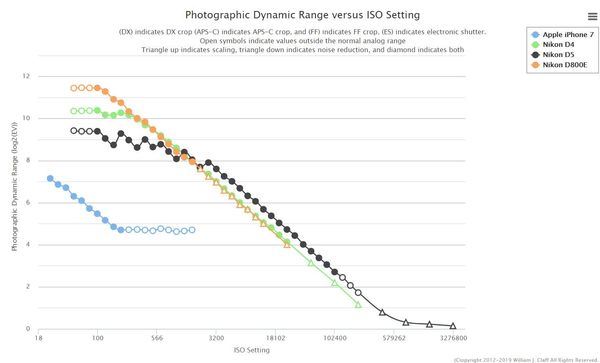overcooked HDR, compressed dynamic range and pop music vs natural sound
Jul 27, 2019 11:40:59 #
Looking through photos on this site and others, I've noticed more and more pictures with (to me anyway) obnoxious HDR halos. Areas that are dark get pulled up and the brighter areas next to the dark area gets brightened also, giving it a halo effect. It winds up looking over cooked. Artistically, I can see why some might like this, but to me it just jumps out and distracts from the rest of the photo.
I was thinking about this over the last few days and realized that most modern pop music is doing the same thing. They compress the dynamic range of the recording to get a consistent volume over the length of the song. Quiet regions get amplified and loud regions get attenuated. Compared to older recordings where the loud and soft passages are an important part of the experience, these compressed recording feel very artificial and annoying, much like the over cooked HDR photos.
When I first got interested in High Fidelity sound years ago, the openness and naturalness of the sound created was always a very important part of the experience. Boom boxes and music processed for loud
clubs and radio changed the way most music got produced. Today, I think we are seeing something similar with the shift to HDR and overcooked post processing. Loud and thumpy music, loud and in your face photos.
I was thinking about this over the last few days and realized that most modern pop music is doing the same thing. They compress the dynamic range of the recording to get a consistent volume over the length of the song. Quiet regions get amplified and loud regions get attenuated. Compared to older recordings where the loud and soft passages are an important part of the experience, these compressed recording feel very artificial and annoying, much like the over cooked HDR photos.
When I first got interested in High Fidelity sound years ago, the openness and naturalness of the sound created was always a very important part of the experience. Boom boxes and music processed for loud
clubs and radio changed the way most music got produced. Today, I think we are seeing something similar with the shift to HDR and overcooked post processing. Loud and thumpy music, loud and in your face photos.
Jul 27, 2019 11:43:25 #
Jul 27, 2019 11:45:39 #
Interesting. It appears light waves and sound waves share similar properties. Music and photography are more closely related than one would think.
Jul 27, 2019 11:46:39 #
claytonsummers wrote:
Looking through photos on this site and others, I'... (show quote)
Dolby audio was supposed to compress the music toward a middle level, but include a signal that defined the amount of compression. That signal could be used to decompress the music later during playback. Compression would avoid clipped peaks and muddy quiet passages. But listening to the music without the Dolby decompression was much as you describe.
Jul 27, 2019 11:48:33 #
claytonsummers wrote:
Looking through photos on this site and others, I'... (show quote)
Agree with you. Subtle HDR is OK for me but overcooked post processing is unrealistic and I do not practice that. In fact images that are overcooked turn me off. However, to each his own.
nrealtisic
Jul 27, 2019 11:50:18 #
DirtFarmer wrote:
Dolby audio was supposed to compress the music toward a middle level, but include a signal that defined the amount of compression. That signal could be used to decompress the music later during playback. Compression would avoid clipped peaks and muddy quiet passages. But listening to the music without the Dolby decompression was much as you describe.
I remember that as well. When it worked, it did a decent job of removing the tape hiss on cassettes. Today it seems like producers are doing it on purpose and actually like (i assume) how it sounds.
Jul 27, 2019 11:54:50 #
HDR might have its place in some advertising photos. As far as photography goes, it simply tells me the camera operator doesn't know how to expose and process. I'll grant that some people like that look. More power to them. I prefer to specifically place my tonal values and produce a photograph that exhibits a bit of planned control.
--Bob
--Bob
claytonsummers wrote:
Looking through photos on this site and others, I'... (show quote)
Jul 27, 2019 12:04:13 #
Broadcast stations, AM and FM, have had peak limiters and compressors in line between the studio and the transmitter for decades. The dynamic range got reduced by all this processing and most of what we heard was all similar volume.
My wife says: "Acknowledged. Find some quiet and a natural scene that will rest your eyes and ears. Sit in the shade and enjoy."
My wife says: "Acknowledged. Find some quiet and a natural scene that will rest your eyes and ears. Sit in the shade and enjoy."
Jul 27, 2019 12:06:38 #
Well, it is all a matter of individual likes and dislikes on the HDR - plus what they were trying to do.
The music, yes they record it louder etc - in some genres.
But the main difference today that I see is the format. MP3 etc just don't have the range of CD and DVD recordings burned from a full spectrum studio recording in one of the high end formats.
For my car I do have MP3 CDs (the highest quality setting so I only get 18-24 tracks per CD) because between my hearing loss from various things and the noisy environment of the car it doesn't matter. But I have only bought about 4 or 5 albums and maybe a dozen singles in down load. Otherwise if I want something enough I track down a studio quality CD or DVD.
And when I really want to "hear" the music full range (well as close as I can get with my hearing and tinnitus) I use a set of BOSE noise canceling headphones.
The music, yes they record it louder etc - in some genres.
But the main difference today that I see is the format. MP3 etc just don't have the range of CD and DVD recordings burned from a full spectrum studio recording in one of the high end formats.
For my car I do have MP3 CDs (the highest quality setting so I only get 18-24 tracks per CD) because between my hearing loss from various things and the noisy environment of the car it doesn't matter. But I have only bought about 4 or 5 albums and maybe a dozen singles in down load. Otherwise if I want something enough I track down a studio quality CD or DVD.
And when I really want to "hear" the music full range (well as close as I can get with my hearing and tinnitus) I use a set of BOSE noise canceling headphones.
Jul 27, 2019 12:07:26 #
Angel Star Photography
Loc: Tacoma, WA
claytonsummers wrote:
Looking through photos on this site and others, I'... (show quote)
Agree on both matters. I find overcooked HDR unappealing and unnatural and likewise with the sound levels of music. With music, it seems that the beauty, the emotions, and the delicacy is lost to where regardless of the lyrics they all begin to sound the same and I find myself pondering what is really new in the song or melody. I guess that is one of the reasons why I find myself taking moments to listen to the works of the 50's through the 70's as well as Beethoven, Mozart, Vivaldi, etc.....)))
Jul 27, 2019 12:12:12 #
I agree 100%. There is nothing ore horrible to me anyway than an over cooked HDR picture. When the picture screams HDR while I am still feet away from the picture it looks like a women plastered with make up. YUCK. iMHO
WJH
WJH
Jul 27, 2019 12:27:49 #
larryepage
Loc: North Texas area
Radio stations have always manipulated dynamic range, because it was (and still is) illegal for them to overmodulate their transmitted signal, but if their programming is not loud enough, listeners will move on. I remember looking at the audio (on an oscilloscope) from the most popular radio station in Dallas years ago and seeing very obvious "hard clipping" to prevent overmodulating while allowing the average transmitted content to be as loud as possible.
A company called dbx came out with a whole range of products to restore dynamic range to music which had been compressed. It worked linearly over the entire range, but also had a function to do different things above a selectable threshold. Used in moderation, it had the ability to remarkably improve the sound of music. Overused, it would create audible "pumping," where the audible background noise would move up and down with the audio level of the content.
As I've mentioned here before, my great aunt had a witticism that seemed to cover a lot of situations like these (and others). It was, "Moderation in all things, even excess."
A company called dbx came out with a whole range of products to restore dynamic range to music which had been compressed. It worked linearly over the entire range, but also had a function to do different things above a selectable threshold. Used in moderation, it had the ability to remarkably improve the sound of music. Overused, it would create audible "pumping," where the audible background noise would move up and down with the audio level of the content.
As I've mentioned here before, my great aunt had a witticism that seemed to cover a lot of situations like these (and others). It was, "Moderation in all things, even excess."
Jul 27, 2019 12:28:06 #
rmalarz wrote:
HDR might have its place in some advertising photos. As far as photography goes, it simply tells me the camera operator doesn't know how to expose and process..l.
--Bob
--Bob
I disagree.
While I'm not a fan of the overcooked look frequently encountered on HDR attempts, the concept of HDR is to allow for the capture of images from scenes in which the dynamic range exceeds the capability of the sensor. This does not appear to be what people use it for, but it is a valid use in my opinion. Of course the devil is in the details and using HDR for a high dynamic range shot can be done without overcooking it.
Dynamic range can frequently exceed the capability of even the pro-level camera bodies. http://www.photonstophotos.net/Charts/PDR.htm is a way to find what dynamic range your camera is capable of as a function of ISO setting. The graph below shows the results for the cameras I use. And I do use those cameras at high ISO levels frequently. (Mr. Claff's software did not include the iPhone 8+, so I approximated it by the iPhone 7 curve).
Jul 27, 2019 12:40:57 #
I agree that HDR techniques make up a very useful set of tools. My personal taste is that if you cannot tell it has been used, it has been used correctly. As other people have mentioned, post processing is a big part of the art of photography by changing an image that the camera captures to represent what the photographer sees in his mind's eye.
Photographs that are obviously not realistic are still art and the ones that make you wonder "how did they do that" are the most interesting to me. To be art, it needs to be about the image and the feeling that it inspires, not showing off the techniques used to make it.
Photographs that are obviously not realistic are still art and the ones that make you wonder "how did they do that" are the most interesting to me. To be art, it needs to be about the image and the feeling that it inspires, not showing off the techniques used to make it.
DirtFarmer wrote:
I disagree. br While I'm not a fan of the overcook... (show quote)
Jul 27, 2019 12:46:40 #
claytonsummers wrote:
Looking through photos on this site and others, I'... (show quote)
Clayton - I completely agree with your assessment of overcooked HDR. And I miss good, clear natural Hifi.
If you want to reply, then register here. Registration is free and your account is created instantly, so you can post right away.







